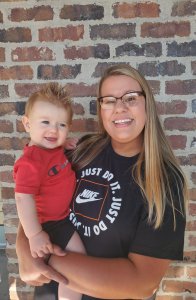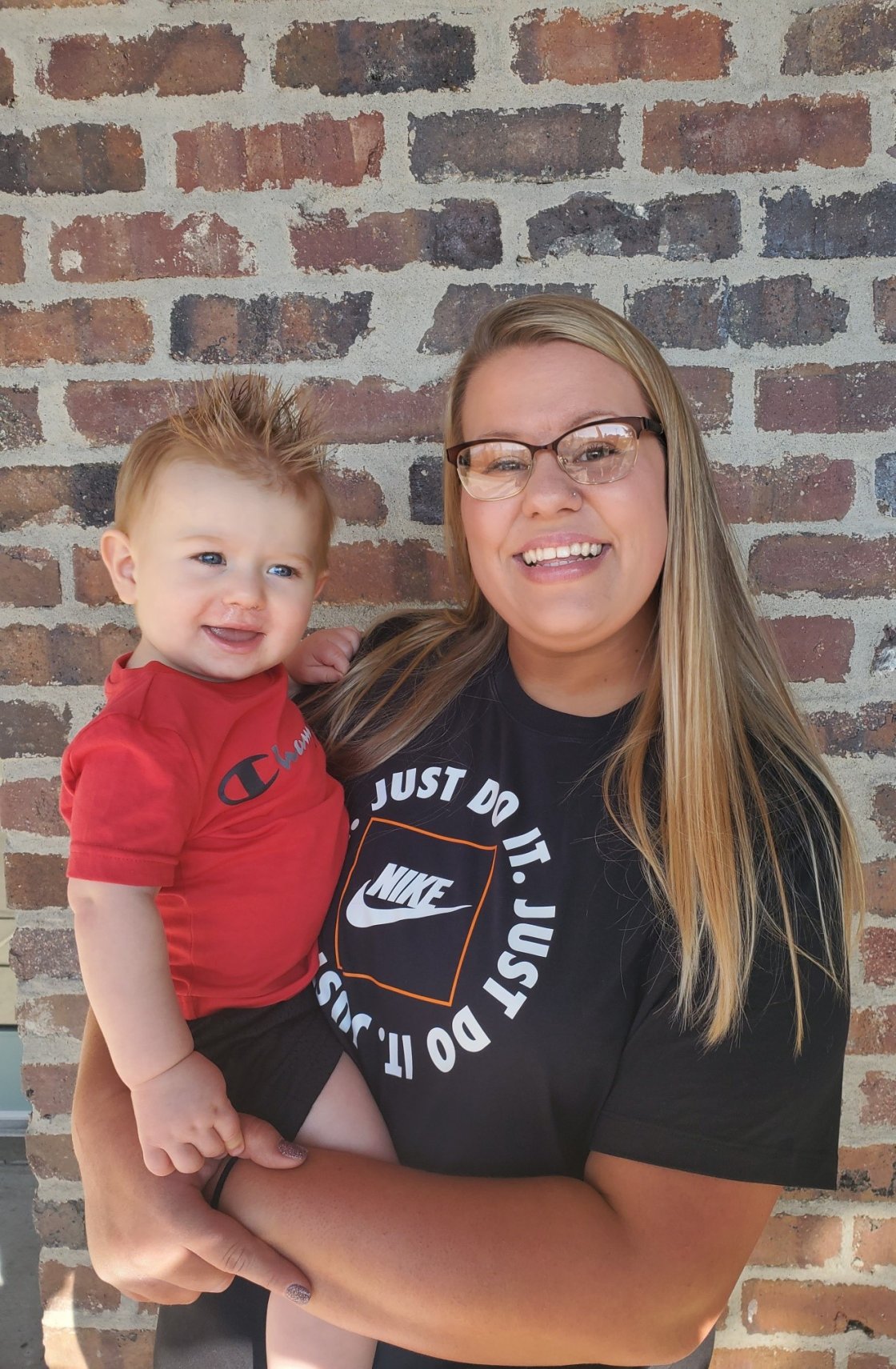
Mackenzi Hall, who is now 19 months into her recovery journey, holds her son Maverick.
By Al Vineyard for Drug Free Ozarks
Stone County Treatment Court is a multifaceted, intense substance-use program addressing substance use disorders and crimes related to drug-seeking behaviors. Last year, 68 individuals graduated the program, gaining skills to overcome dependency on substances and learning how to live healthy, productive lives.
Stone County Treatment Court, known by many as drug court, is part of the 39th Circuit Court. The program’s success relies heavily on the collaboration of many organizations, including Burrell Behavioral Health, Alliance Counseling, Probation and Parole, Certified Peer Counselors, and other community resource organizations, including Skaggs Foundation which provides grants for this holistic and humanistic approach to treatment and recovery.
Mackenzi Hall, a recent drug court graduate, is now 19 months into her recovery journey.
“The tools the program has given me help me to stay sober,” Hall says.
Before the program, she never had more than 60 days of continual sobriety since she started using drugs.
Today, she enjoys her accomplishments, the recovery community, and being a mom to her baby son, Maverick. At her drug court graduation, her massive support system occupied three rows in the New Testament Church auditorium.
Hannah Wise is still in drug court.
At first, the program and restrictions were uncomfortable for her. After being numb from substances for so long, the sudden surge of emotions was scary and foreign. The program helped Wise learn to control her emotions and ultimately find herself again.
Wise has now been in drug court for 15 months. She celebrated one year of recovery in July of 2020, and relapsed. The treatment team gave her a sanction, sent her to a rehabilitation facility, and kept her in the program. They believe in second chances.
Keeping a participant in the program after a relapse makes this program extraordinary. The drug court team realizes that these individuals are human. Mistakes happen. The team addresses the mistake and helps the participant learn and grow from it.

Hannah Wise is in her 15th month as a Stone County Treatment Court participant.
Today, Wise continues to work the program, and she does so with the most beautiful smile and genuine happiness shining through her eyes.
Hall and Wise are only two of the lives touched by this program.
The graduation rate is 71 percent and recidivism rate three years after graduation is less than 20 percent.
Judge Alan Blankenship has been the sitting judge for Stone County Treatment Court since its inception in 2004.
He is passionate about the treatment court program. He explains that it targets qualifying felons who present a high risk of failing traditional probation and recidivism. Participants cannot have a violent or sex-related offense, however, felonies involving drug possession, paraphernalia, and non-violent drug-seeking behaviors qualify.
After a participant has been accepted into the program, they receive a complete assessment to establish an individualized treatment plan.
Substance use disorders are often present with additional mental and behavioral disorders. It is important to address the additional disorders, as well, or the treatment for substance use disorder will not be as effective. For this reason, Stone County Treatment Court pairs substance use treatment with trauma therapy, behavioral therapy, one-on-one counseling, and group counseling. This aspect of the drug court program addresses the mental, emotional, and behavioral well-being of each participant.
The program consists of five phases. Each phase contains new levels of responsibilities and requirements for the participants. Once the participant completes the requirements in one phase, they graduate to the next. Phasing up is a celebratory occasion and a source of pride and feelings of accomplishment for participants.
As part of the program, each participant is required to give back to the community by completing community service hours. In 2020, during the COVID-19 pandemic, Stone County Treatment Court participants completed more than 15,000 hours of community service. They not only give back, but they also learn good citizenship.
Another requirement embraces the education of participants. Each participant is required to obtain their high school equivalency. This accomplishment boosts self-esteem while creating more opportunities for the future.
Additional requirements include regular court appearances, minimum days of sobriety per phase, random and weekly drug tests, fees, and restitution.
Each participant is also required to create and present to the court a treatment plan, a relapse prevention plan, peer recovery and prosocial activities, and an aftercare plan. This equips the individual with information about what to do when temptations or triggers present. It also gives the individual knowledge of safe, fun, and sober activities. For those in recovery, understanding how to have safe, sober fun is just as important as understanding relapse prevention.
Funding for the program is provided by multiple sources with a majority of the funding coming from state appropriated funds and grants with a small amount being generated from participant fees. Some local grants, such as a $30,000 grant from the Skaggs Foundation addresses two very specific needs for the participants.
Housing is the first need the Skaggs Foundation grant helps address.
Treatment Court Administrator Matt Ouren explains that participants are often accepted into the program directly from jail. This means participants frequently lack safe and adequate housing. The grant covers the fees for the first 30 days at a structured sober housing facility. This helps cover expenses during the first phase of drug court when employment is not required.
The second need addressed by Skaggs Foundation’s grant is dental care.
Many times individuals suffering with substance use disorders do not receive proper preventative dental care. Combine that with the devastating effects of substance use and teeth will become damaged, broken, and decayed causing extreme pain and discomfort. This grant covers up to $2,000 worth of dental care for qualifying participants. Fixing dental problems alleviates pain and elevates self-esteem.
The Stone County Treatment Court team consists of 11 people who focus on every aspect of recovery, providing tools, and creating a strong foundation for those in recovery. Stone County Treatment Court’s dedicated and passionate team, and the organizations who boldly support it, including Skaggs Foundation, are changing the lives of the participants while enhancing the overall community in which it operates.

